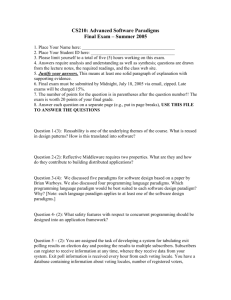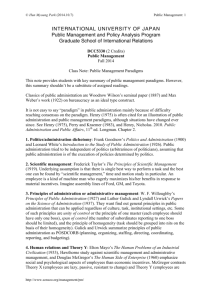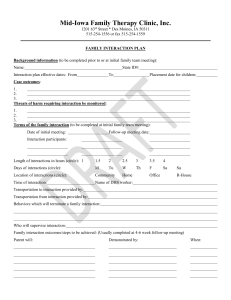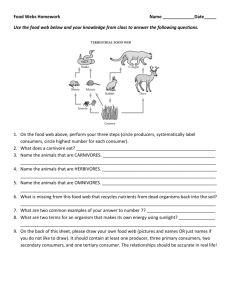The 7 Habits of Highly Effective Teens
advertisement
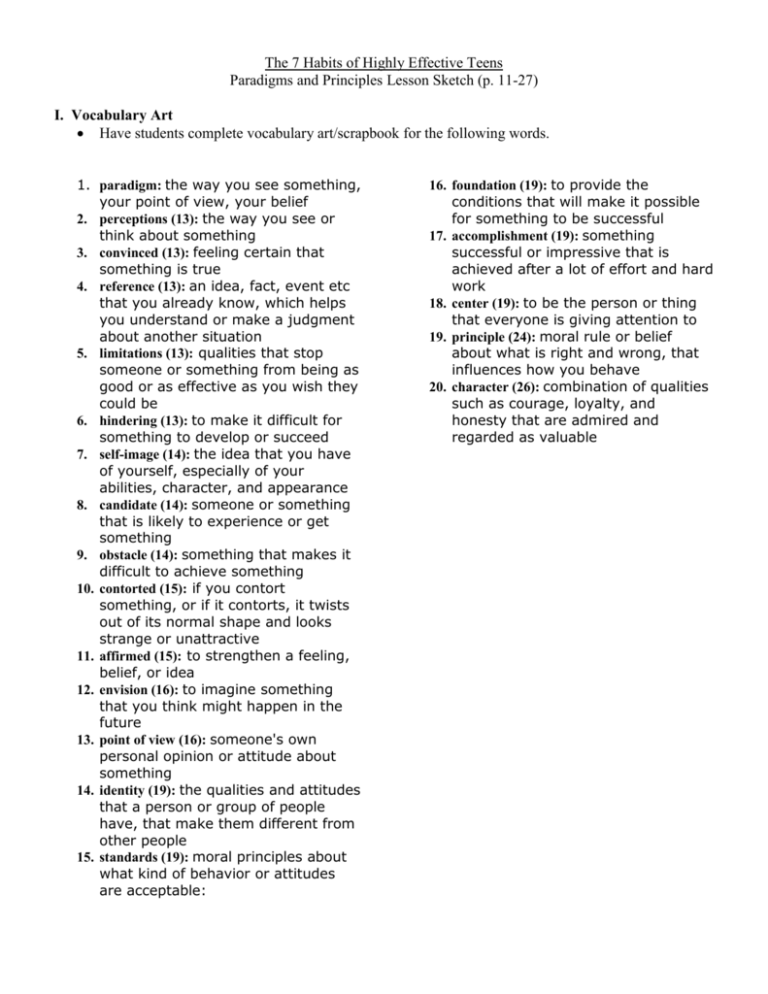
The 7 Habits of Highly Effective Teens Paradigms and Principles Lesson Sketch (p. 11-27) I. Vocabulary Art Have students complete vocabulary art/scrapbook for the following words. 1. paradigm: the way you see something, your point of view, your belief 2. perceptions (13): the way you see or think about something 3. convinced (13): feeling certain that something is true 4. reference (13): an idea, fact, event etc that you already know, which helps you understand or make a judgment about another situation 5. limitations (13): qualities that stop someone or something from being as good or as effective as you wish they could be 6. hindering (13): to make it difficult for something to develop or succeed 7. self-image (14): the idea that you have of yourself, especially of your abilities, character, and appearance 8. candidate (14): someone or something that is likely to experience or get something 9. obstacle (14): something that makes it difficult to achieve something 10. contorted (15): if you contort something, or if it contorts, it twists out of its normal shape and looks strange or unattractive 11. affirmed (15): to strengthen a feeling, belief, or idea 12. envision (16): to imagine something that you think might happen in the future 13. point of view (16): someone's own personal opinion or attitude about something 14. identity (19): the qualities and attitudes that a person or group of people have, that make them different from other people 15. standards (19): moral principles about what kind of behavior or attitudes are acceptable: 16. foundation (19): to provide the conditions that will make it possible for something to be successful 17. accomplishment (19): something successful or impressive that is achieved after a lot of effort and hard work 18. center (19): to be the person or thing that everyone is giving attention to 19. principle (24): moral rule or belief about what is right and wrong, that influences how you behave 20. character (26): combination of qualities such as courage, loyalty, and honesty that are admired and regarded as valuable *Idea- create a Know Book for all written portions II. PREREADING A. Students break into groups, skim through the text and highlight vocabulary words and underline new words. B. Groups share which words they have found, teacher uses overhead & underlines words. As students are sharing teacher underlines the words on the overhead, and at the end the class numbers the new words. On a separate piece of paper students define words (divided up) on a separate sheet of paper (students share definitions they found, and use this sheet as they read along). C. Students skim over text and read titles, subtitles, and look over pictures (share/write down what they think the text is going to be about, what pics remind them of). D. Johnathan’s Paradigm Activity. III. READING A. Begin reading. Discuss quotes. At bottom of page 12 students add a statement that they or someone they know has said. B. Continue reading on top of pg. 13. Students write down/share what the pic (student in glasses) means. C. On separate piece of paper have students answer the following questions: Some positive paradigms I have about myself are; Some negative paradigms I have about myself are; Paradigms that my parents or guardians, boss at work, or teachers at school might have about me are; Their paradigms match mine (true or false); Could they be right? How will I find out? D. Have students answer the question on bottom of pg. 13- “Are your paradigms of yourself helping or hindering you?” E. Continue reading pgs 13-16- “Paradigms of Self.” PG 13 (bottom) have students answer question about paradigms being a hindrance (respond in margin). PG . 14 ask- or have students write an answer to – when have you experienced a paradigm shift (respond in margin)? On bottom of PG 15 ask what the quote “whenever I need to be affirmed I’d talk to my mom and she’d clean my glasses” means (respond in margin). Ask- who do you have to help shift your paradigm? F. Read Paradigms of Others (17-18)- have students respond to the comic- ask them to write about what it represents (respond in the margin). G. Read Paradigms of Life (18)- Have students respond to questions- what do I spend my time thinking about, what is my obsession. H. Have students complete following survey to help determine their life center, once they’ve determined their center have them read the related section. LIFE CENTER SURVEY 1. You are at home on a Tuesday night doing your math homework. It’s slow-going and boring. You hear your friends drive up to the curb and yell that they’re heading out to dinner. What do you do? A. You decide to keep doing your homework, even though it’s boring, circle letter F. B. If you decide to go with your friends and tell yourself that you can always do your homework later, circle letter A. A B C D E F 2. Your family is planning a five-day vacation to Hawaii. You want to go, but taking five days off work means that you won’t earn as much to buy clothes for school. What do you do? A. If you decide to stay home and continue working, circle letter B. B. If you decide to go with your family to Hawaii, circle letter F. A B C D E F 3. You are at home getting ready to go out with your friends-they’ll be there any minute. The phone rings and it’s your boyfriend/girlfriend. He’s/She’s wondering if you can come over right now to hang out and watch a video. What do you do? A. If you decide to go to your boyfriend’s/girlfriend’s house, circle letter C. B. If you decide to tell your boyfriend/girlfriend that you have plans with your friends, circle letter F. A B C D E F 4. It’s 11:00 p.m. and you’re studying for your English lit test. You’ve been studying all evening and you’re pretty sure you’ll do well on the test tomorrow. You’re tired and want to go to bed. But you have an Aaverage in the class, and if you study a little longer to ensure that you ace the test, you can bring your average up to a solid A. What do you do? A. If you decide to go to bed to renew yourself, circle letter F. B. If you decide to stay up longer to ace the test, circle letter D. A B C D E F 5. You’re attending college recruitment day (when colleges come to schools and talk to students about attending their college) at your school and you are sitting in one of the presentations. You’re overwhelmed. You have no idea what you want to be “when you grow up,” and you have no idea what college to attend. The presentation you’re in is for the college your mother wants you to go to. You don’t know what you want to do, but you’d rather just have the decision over with. At the end of the presentation the presenter asks the class to fill out applications. What do you do? A. If you decide to wait and fill out an application after you’ve thought about your options a little more, circle letter F. B. If you decide to fill out an application, circle letter E. A B C D E F Count up the number of times you circled each letter and record the numbers here: A: B: C: D: E: F: ANSWER KEY: Letter F: If you circled 3 or more F’s, you have a pretty healthy life center. Letter E: If you circled 1 E, read page 22 to examine if your life is too parent-centered. Letter D: If you circled 1 D, read page 21 to examine if your life is too school-centered. School is important, but you don’t want to overdo it!! Letter C: If you circled 1 C, read page 20 to examine if your life is too boyfriend/girlfriend-centered. Letter B: If you circled 1 B, read page 19 to examine if your life is too stuff-centered. There’s nothing wrong with accomplishing and enjoying your stuff, but never center your life on things that in the end have no lasting value. Great memories of vacations and family times will last forever. Letter A: If you circled 1 A, read page 19 to examine if your life is too friend-centered.
